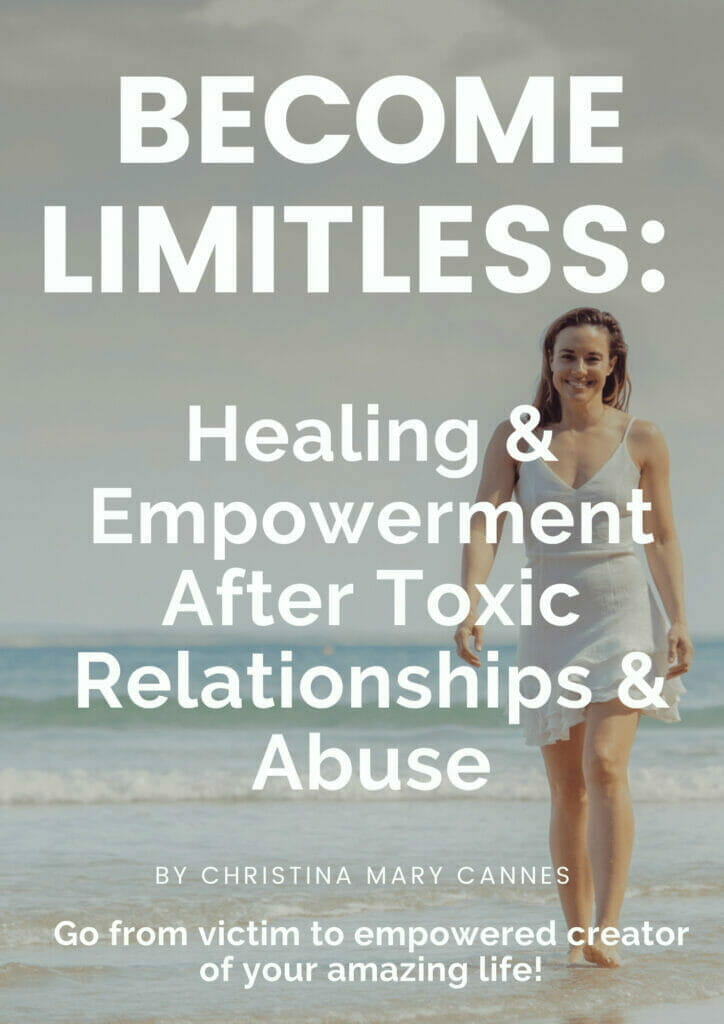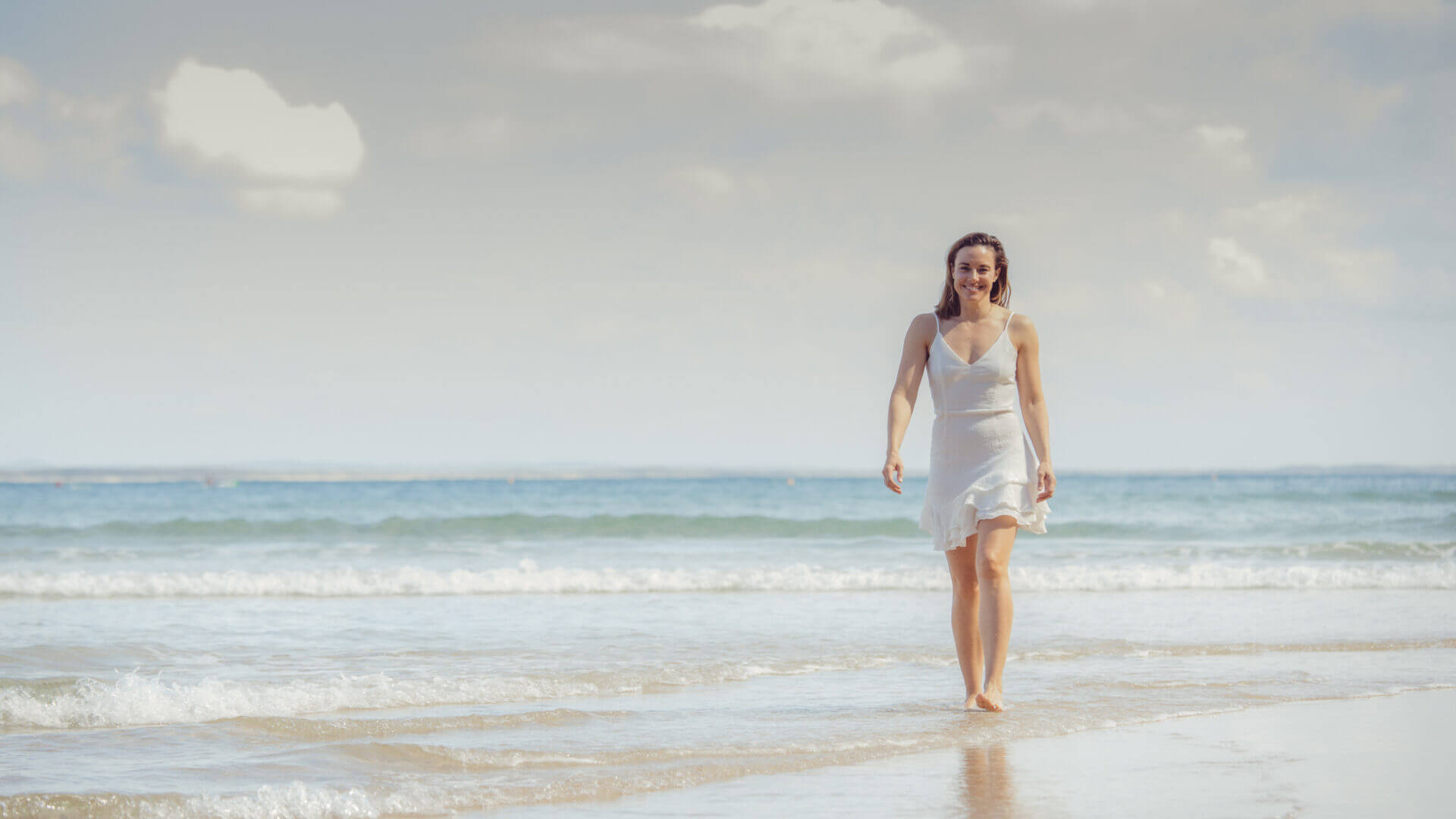In the United States, as many as one in four women and one in nine men are victims of domestic violence. In Australia, one woman a week is murdered by her current or former partner, and 1 in 3 women and 1 in 5 men have experienced at least one incident of violence from a current or former partner since the age of 15.
To help survivors heal from the trauma of domestic violence and abuse – and educate people about domestic violence and its effects – survivor Christina Cannes wrote an ebook to share her knowledge and the tools that helped her heal from domestic violence and abuse. In this book, Christina will show you how to heal from the trauma of abuse and ways to recognise and keep toxic and abusive people out of your life.
“When people think of domestic violence, they picture a certain socioeconomic scenario,” explained Christina. “They think of people living in poverty abusing drugs and alcohol and giving each other black eyes. And because of their situation in life, people assume that’s just what happens – it’s a stereotype. But that isn’t the only scenario for domestic violence. Domestic violence affects everyone – especially future generations. And no one deserves it, no matter their life situation.”
Christina Cannes grew up in the US. From the outside, her life looked golden. Raised in an affluent suburb with two parents – one a teacher and the other an engineer – she succeeded academically in her younger years, played sports such as tennis, softball and soccer, and had a group of healthy friends. No one knew what was really going on at home.
“By the time I hit high school, I was melting down,” explained Christina. “I struggled with an eating disorder – bulimia – and began to fall into the familiar trap of drinking and hanging out with the wrong crowd. My good grades disappeared, I skipped school, and the bulimia became so bad that my mother finally took me to a psychiatrist. But even with my psychiatrist, domestic violence and abuse were never discussed or explained. He just put me on Prozac and said I had a chemical imbalance in my brain. He didn’t understand that I was being physically and emotionally abused. He never explained to me how unsafe and unhealthy my home life actually was despite what I told him.”
Police and courts did little to intervene. After four years of court battles, her parents finally divorced, and things settled down. Christina went on to graduate from university with honours and begin a successful career in marketing. Even in her twenties, she abused alcohol to cope with and numb the past.
“While I knew my childhood was horrific, I still unconsciously thought it was all my fault,” explained Christina. “Children don’t understand why their parents hurt them. I had no self-esteem, and I thought I was just broken. I fundamentally believed I did not deserve love and that I was not good enough. And I didn’t have the tools to help myself.”
“It wasn’t until I was in my mid-twenties that I discovered what personality disorders were and how they contributed to abuse. After watching an investigative show about serial killer Ted Bundy, I realised that my father shared many of his same characteristics – severe narcissism (NPD) and psychopathy (Antisocial). I researched the disorder, and although this allowed me to understand cognitively, my childhood abuse was not my fault; it did not change things on my subconscious level – I still believed they were my fault.”
Fast forward to age 28. Christina had moved to Australia, married, and given birth to a baby boy. Because Christina had not properly healed her abuse from childhood, she had unconsciously married a man just like her father and mother – narcissistic, showing signs of psychopathy and emotionally abusive.
“It wasn’t until after the birth of my second child that I knew for sure something was terribly wrong.”
Christina began seeing psychologists, one because she suspected post-natal depression, another to help her with anxiety, and then another for the relationship.
“All up, I visited over seven psychologists during my seven-year marriage – even one a two-hour drive away – and none of them understood that I was being abused. None of them even muttered the word. Only one of them even made the connection between my childhood and the same patterns showing up in my marriage. I think it had a lot to do with how high-functioning I was – I looked healthy, had two beautiful kids, a great career, house – I didn’t fit the perceived description of domestic violence. I wasn’t being beaten, but I was being abused emotionally and financially.”
It wasn’t until her own marriage broke down that the word abuse was finally put on the table.
“I was back in the US visiting family. My husband had begun an affair with another woman, so I was trying to figure out what to do. I was scared, and I didn’t want to go see another psychologist, so I went to see a dear friend. She was the first one who had ever said to me, ‘You are being abused, and you have been abused your entire life.’ As soon as I heard the word abuse, it was a revelation. No one had ever explained it to me.”
Christina returned to Australia to begin divorce proceedings, knowing that she had a tricky battle.
“No one understands abuse unless they’ve been through it. When it comes to domestic violence, victims need protection, and what I found is that police and courts are not equipped to handle it properly. There were some wonderful organisations, such as SCOPE, which helped me with DV support while I was dealing with protection orders and custody, but besides that, I was pretty much on my own – and it was terrifying.”
What Christina found most distressful was how little support was available after the court orders were finally signed. Victims of domestic violence and abuse experience PTSD, or post-traumatic stress disorder, similar to soldiers returning from war. But unlike soldiers, our battle can last for decades and leave us in a constant state of fight-or-flight, our health impacted by adrenal fatigue and burnout, and emotionally distressed while our children continue to visit the abusive former partner. A better classification is CPTSD, complex post–traumatic stress disorder. This is closely related to post–traumatic stress disorder but occurs when someone is exposed to prolonged or repeated trauma over a period of months or years.
“I was exhausted, alone, traumatised and scared. And I knew I needed to heal, not only from my recent divorce but my childhood. I knew that my childhood was creating patterns in my life that kept repeating themselves, and I didn’t want to live like that anymore.”
Christina decided to take a different route and began to work with professionals who helped her directly heal her abuse – by accessing her subconscious beliefs and processing stored trauma. These beliefs created during childhood (from the ages of 0 – 14) laid the groundwork for what she would experience in her adult life. Because her childhood was abusive, she would, therefore, experience or perpetuate abuse later on.
“After over a decade of healing, I’m a new person,” said Christina. “I am healthier and happier than ever, and so are my children. We have a wonderful life in Noosa – it’s beyond what I thought was possible for me.”
Inspired to help others, Christina wrote her book for people like her – those who have experienced abuse as a child or recently left an abusive relationship – and want to heal. But she’s developed a quicker way to approach the process.
“I don’t want people to spend years working on this stuff – I want them to heal fast so they can go on to live a great life.”
“It’s time we stopped normalising abuse and assuming that only certain types of people suffer from domestic violence – and that abuse is only physical. Abuse takes many forms, including emotional, financial, spiritual, and sexual. I want to give people tools to heal themselves and empower people to live their best lives free of abuse. No one should feel ashamed or guilty about being abused. I want to show them how to heal as quickly as possible.”
“We also need to understand that domestic violence is not a stand-alone issue,” explained Christina. “Domestic violence is a symptom of an abusive society. Trying to fix domestic violence within the confines of a society founded on abuse (power and control over people) will not work. We need to fix the root cause, which would require a complete overhaul of life as we know it. Imagine a society where all people are equal, and violence has been eradicated because everyone has everything they need to survive. That would certainly solve so many of our problems, including violence against men, women and children.”
To buy a copy of Christina’s ebook “Become Limitless: Healing and Empowerment After Domestic Violence and Abuse”, click HERE.



